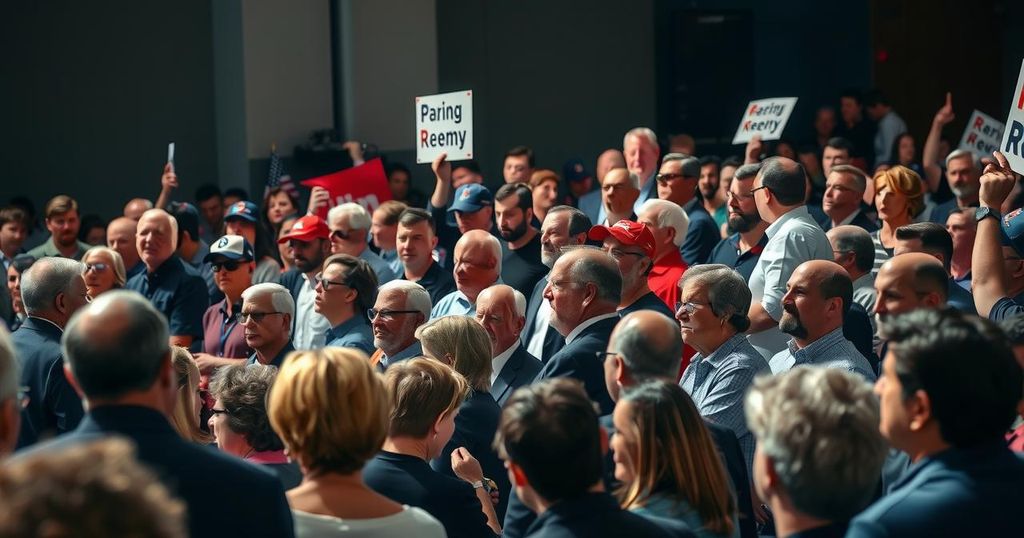World news
2024 PRESIDENTIAL ELECTION, AMERICA, ASIA, BIDEN, CHRIS DEVINE, DEMOCRATIC PARTY, DEMOCRATS, ELECTION, GOP, JOE BIDEN, MEXICO, NORTH AMERICA, PEW RESEARCH CENTER, PHILIPPINES, PRESIDENTIAL CAMPAIGN, REPUBLICAN PARTY, TNND, TRUMP, U. S, U.S. ELECTIONS, UNITED STATES, UNIVERSITY OF DAYTON, US ELECTIONS, WASHINGTON
Fatima Khan
0 Comments
Republican Voter Support Rises as Democrats Face Coalition Dilemmas Post-Election
Republicans have gained voter support, with a Pew Research poll showing 50% of Americans believe the GOP represents them well, compared to only 43% for Democrats. This shift follows a poor performance by Democrats in the recent elections, prompting internal debates on future strategies. Trump’s appeal among diverse voter groups has raised concerns for the Democratic coalition, and the impact of his upcoming administration on public sentiment remains to be seen.
Republicans have experienced a significant shift in voter perception in the wake of the recent elections, as for the first time since Donald Trump became the leader of the GOP in 2016, a majority of Americans believe the Republican Party better represents their interests. A Pew Research Center poll indicated that 50% of Americans feel aligned with the GOP, compared to just 43% for the Democratic Party, a notable decline for Democrats, marking their lowest approval rating in nearly eight years. This shift coincides with an examination of the election results of November 5, as each party analyzes strategies for establishing enduring majorities in the political landscape.
Trump’s approach has emphasized traditional Republican values, including tax cuts and stricter immigration policies, while portraying himself as a candidate for change, particularly in opposition to President Joe Biden. As Trump prepares to assume office, he is seen as having considerable support for his policy agenda among Republicans, although broader voter backing remains mixed. The Democrats now face the challenge of redefining their coalition after a disappointing election cycle during which they failed to secure key positions and lost ground in battleground states.
Internal party debates among Democrats focus on strategies moving forward, with criticism directed towards Biden for his late decision to withdraw from the race and for the party’s perceived neglect of working-class voters. Republican leadership contends that their recent electoral successes signify a mandate to adopt Trump’s policies, though the actual electoral mandate remains contentious given the slim majorities achieved. Trump notably made gains among traditionally Democratic demographic groups, such as Latino and Asian American voters, which has raised alarms regarding the stability of the Democratic coalition.
Professor Chris Devine remarked, “There are real coalitional problems that Democrats have that they should be concerned about. But the test is going to be not where Americans were on Nov. 5 or even where they are on Dec. 5, but let’s see where they are when there’s a new Trump administration.” As political sentiments remain fluid, the long-term impact of the incoming administration on voter preferences will be closely monitored, particularly as midterm elections historically present challenges for governing parties.
In the wake of November 5 elections, a discernible shift has been observed in the political landscape of the United States, particularly with respect to voter allegiance to the Republican Party under Donald Trump’s leadership. After a series of elections marked by Democratic victories, the recent shift has raised critical questions about the future strategies of both parties and the possibility of forming lasting coalitions. This development comes as Democrats reevaluate their appeal to diverse voter demographics and respond to Trump’s changing support among them. Trump’s policies that resonate with certain voter bases, coupled with a contrasting public perception of the Biden administration, serve as significant backdrop elements.
In conclusion, recent polling highlights a notable shift in voter allegiance, favoring the Republican Party under Donald Trump—reflecting a growing perception among Americans that the party better represents their interests. As Democrats navigate their coalition challenges following a disappointing electoral performance, the future of both parties remains uncertain. The ability of Trump to appeal to a broader electorate, particularly traditionally Democratic demographics, will be pivotal in shaping American politics in the years to come. Moreover, ongoing evaluations of public sentiment will prove essential as the new administration begins its tenure.
Original Source: bakersfieldnow.com




Post Comment